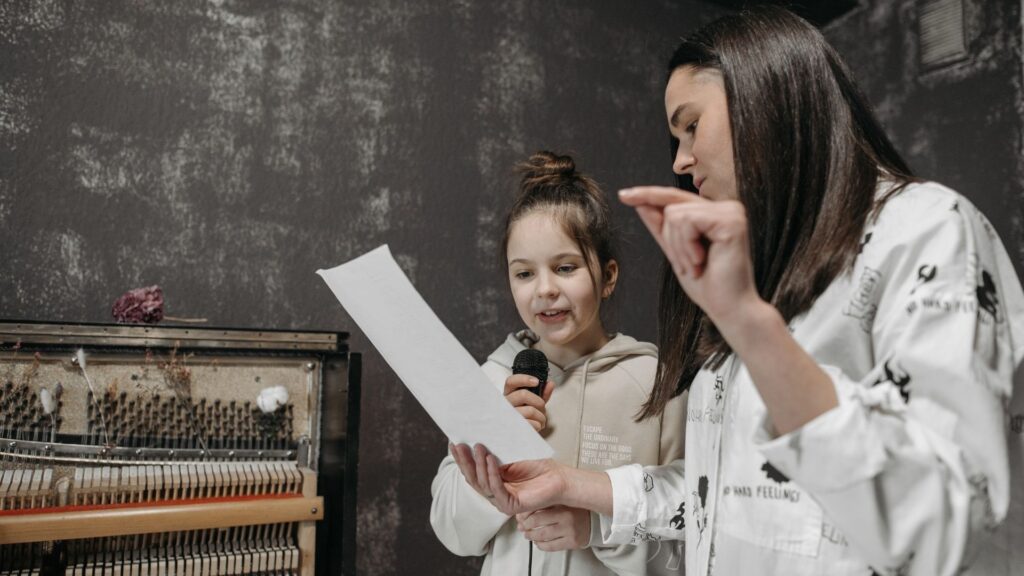
Train With the Best and Be the Best
The human faculties of sight, hearing, speech, feeling, thought, empathy, and love are arguably the greatest gifts evolution has bestowed upon us. The ability to communicate and see clearly has risen to the top of our list of most prized abilities.
Maybe you want to improve your voice for public speaking, singing, or dubbing and need a trainer/coach. The goal of working with a vocal trainer/coach as a singer is to develop a voice that can hold its own on a global stage.
Singing is difficult enough that even top performers seek out coaching at some point in their careers. Breathing properly, standing tall, and pronouncing words clearly are all skills that need time, effort, and practice to master. Reaching the highest notes in a song is only the beginning of what voice trainers can help you do. Having a powerful voice can give you an air of unwavering assurance, a captivating tone, and the ability to convey your message with crystal clarity.
If you want to sing professionally (on American Idol or just in front of a few pals on a rainy day), then you should consider taking voice lessons. In such a case, voice trainers associated with Sirwiss are your greatest bet for success. If you want to improve your singing voice and to find the ideal trainer/coach but don’t know where to start, then, this article is for you.
Choosing a Vocal Instructor/Coach

First, let’s look at the key differences between a vocal teacher and a vocal coach before diving into the specifics of how to choose one and what technique or coach is best for you. It’s possible to locate a coach with expertise in both areas, but it’s more common for them to focus on just one.
In contrast, a “vocal coach” will go swiftly through scales without much explanation and spend most of the hour accompanying you on piano or working on your songs. You may tell your coach is a “voice teacher” who specializes in mechanical voice production if they put greater emphasis on technical exercises and finding solutions to technical problems. Your coach is both a “voice teacher” and a “vocal coach” if they place equal emphasis on both areas.
Let’s break down the differences between a “voice teacher” and a “vocal coach”.
1. What Is a Voice Teacher?
A voice teacher, also known as a singing teacher or a vocal technique instructor, instructs singing technique. Typically, voice instructors are trained in vocal pedagogy. Simply put, vocal pedagogy is the art and science of voice production. How a person’s voice sounds. The education of Singing Teachers may originate from a university, apprenticeship, training program, or voice teacher certification.
The voice teacher instructs the student in the fundamentals of singing in order to develop a robust and healthy singing voice, focusing on the following:
1.1 Breathing
1.2 Support
1.3 Posture
1.4 Tone creation
1.5 Placement of sound
1.6 Range
1.7 Blending between registers to eliminate vocal breaks
1.8 Endurance and excellent control.
There are several vocal techniques that are used to help the student achieve their goal.
2. What Is a Vocal Coach?
A vocal coach “coaches the voice of a singer.” A vocal coach usually works under the assumption that a performer already knows how to sing well. As a result, a voice coach is hired to help the singer enhance her performance. Students who need a vocal coach almost always have to perform in front of an audience. This could be for an audition or to prepare for a performance. The vocal coach can help the student attain these goals and more.
2.1 Flawless execution of songs
2.2 Vocal arrangements
2.3 Vocal phrasing, articulation, and enunciation
2.4 Pitch and volume (when to sign softly or more vibrantly)
2.5 Excellent on stage performance (conveying the song through body language, eye contact, hand gesturing, microphone technique)
It is important to remember, however, that while a vocal coach may concentrate on singing methods during coaching sessions, this is not their primary goal because they do not teach singing.
Should You Get a Vocal Coach?

If you want to develop a decent technique and a powerful singing voice and are truly committed to taking your music career to the next level, you will need the assistance of a vocal coach. Lady Gaga, Beyonce, Chris Martin, and John Mayer, to name a few, have collaborated with a dedicated vocal coach to advance their careers. To perform at the 2015 Oscars for the Sound of Music tribute, Lady Gaga worked with a vocal coach every day for six months. That is the significance of a vocal coach.
A vocal coach can assist with:
- Improve your vocal health
- Improve the quality of your vocal performance
- Flawlessly execute your songs
- Improve your stage performance
- Critique and guide your singing
- Accountability
Finding the Right Vocal Coach

How do you locate the correct vocal coach? What should you watch out for? What questions should you ask a vocal coach in order to determine if they are a good fit? Selecting the ideal coach is essential to your success. You do not want to invest time and money in someone who will not produce results. There are numerous individuals claiming to be vocal coaches and promising extraordinary results. Don’t give in to the seduction just yet. Before discussing the factors to consider when selecting a vocal coach, let’s discuss the steps you must take prior to locating one.
Questions to Ask Yourself Before Finding a Vocal Coach
1. What’s Your Objective?
Before searching for the best coach, this is the first question you should answer. What goals do you hope to accomplish with your private lessons? Do you want to feel more confident in your vocals and enhance your stage presence? Do you need to prepare for a stage performance or impending recording? Do you wish to advance in your music vocation and require assistance? Knowing your objectives from the outset will aid you in finding a vocal coach who can help you achieve them.
2. What is Your Style?
There exist a variety of musical forms and genres. You must decide which one you will prioritize. Knowing your musical style will assist you in selecting a vocal coach who specializes in teaching that style. You do not want a vocal coach who only teaches opera if you are a country singer. If you are a mainstream singer, you do not need a musical theatre coach with stage experience. You desire to collaborate with vocal coaches who are proficient in the style you wish to master.
3. Should You Look for In-person or Online Lessons? What’s the Difference?
Some students prefer classes in person, while others are content to study from the comfort of their own residences using Zoom. Online classes offer greater instructor choice and flexibility. For example, if you have a job with a demanding schedule, you may find that online lessons are more convenient. You may prefer online lessons to avoid the difficulties of inclement weather, commuting, or lack of access to quality instructors who may not be in your area. The ability to record your sessions professionally and store them on your desktop so you can review them at your leisure is a benefit of online lessons. Less popular than online courses, in-person instruction is also beneficial, particularly for beginners who may require more hands-on assistance.
4. What is Your Budget?
In this case, there are two schools of thought.
1) Less expensive coaches may be more affordable, but do they possess the knowledge you require? It could take twice as long to train with someone who lacks expertise.
2) A more expensive coach comes with years of experience and expertise.
The greater the reputation, the faster the results, and the more you will protect your investment with a technique and direction that will prepare you for a professional career, the greater the return on your investment.
When Choosing a Vocal Coach

After answering these questions, you are prepared to begin your search for the ideal vocal coach. Here are six considerations to keep in mind.
1. Experience and Capability
Your vocal coach should be able to demonstrate or show you to some extent what they want you to do. This may pertain to singing or performance. Avoid coaches who only “tell” and do not “show” Practical demonstrations will accelerate your learning.
Consider their experience as well. What outcomes do they produce? This is due to the fact that each student is unique and has various challenges and objectives. Your vocal coach’s experience will enable him or her to tailor your courses to your specific needs.
Many instructors display students with whom they have worked! Go observe! If all of their singers sound identical, I would steer clear of this. An excellent technique does not produce cookie-cutter results, but rather enables you to develop your own natural sound as your style evolves.
2. Does the Vocal Coach Promote Vocal Health?
Due to improper techniques and instruction, some pupils have damaged their vocal cords. Don’t be in this position! There is nothing more essential than having a healthy singing voice and training with a technique that incorporates health. Some coaches train singers to sing too loudly as a form of exercise. However, this can easily harm a singer’s vocal cords and voice. Before attaining a certain level, vocal technique should never be practiced audibly.
Inquire about the vocal coach’s methods for maintaining vocal health during the interview process. As stated previously, your voice is your instrument; therefore, it must be preserved. A knowledgeable vocal coach can provide you with a detailed plan for maintaining your vocal health. If they are effective, you will not experience vocal fatigue by the end of your lessons. Incorporating vocal therapy and vocal health into our technique prevents professional vocalists from ever losing their voices.
3. Reputation
A good reputation is essential, and one way to find a vocal coach with a good reputation is typically through recommendations within the industry and/or a list of notable clients. Singers or voice specialists will be the most trustworthy sources of information concerning a coach. Therefore, begin to disseminate information.
Ask other singers in your area, contact music industry organizations, get in touch with institutions in your area that offer music programs and instruction, and speak with choir members in local churches. If you have a voice specialist, ask him or her for recommendations. Once you’ve compiled a list of recommendations, you can begin sorting them.
4. Compatibility
You want a coach who not only has the necessary experience, but also listens to you, encourages and motivates you to achieve your objectives. Choose an individual who makes you satisfied. Similar to selecting a therapist or life coach. You and your coach must be on the same page and share a similar mentality and outlook. Vocal lessons can be quite rigorous, and you will make numerous errors and feel extremely vulnerable. You need someone who “gets” you, who has your back, who can make you feel secure learning, and who can teach you confidence.
It may be difficult to assess compatibility during an interview or initial meeting, or you may know immediately! If they have online videos, you can immediately get a sense of them. In either case, after a few sessions, you should be able to determine whether or not you are compatible.
Questions to Ask a Vocal Coach in an Interview
Here are our top six queries to ask a vocal coach or a member of their team.
- Which technique is taught? Where does it come from?
- What styles and genres are covered? Can you teach me to sing in my style?
- These are my goals. How will you help me achieve them?
- How long have you been coaching?
- Do you have testimonials? Is there a way for me to hear other students you teach?
- What are your rates and availability?
- Can I have a consultation with the teacher before starting?
- Can I have a trial lesson? – Most well-known teachers don’t do trial lessons as their years or decades of experience and their clientele speak for their expertise. For lesser-known coaches that may not be booked they may be open to a trial lesson, but most won’t offer this. However, it’s great to set up a few sessions with different teachers to see who you connect with before committing.
The ideal vocal coach for you exists. You may need to examine several before locating the appropriate one. Once you have selected a vocal coach, you should see improvement from the very first session. Give it three months before attempting a new coach. In addition, don’t be afraid to test out other coaches, as each has something unique to offer.